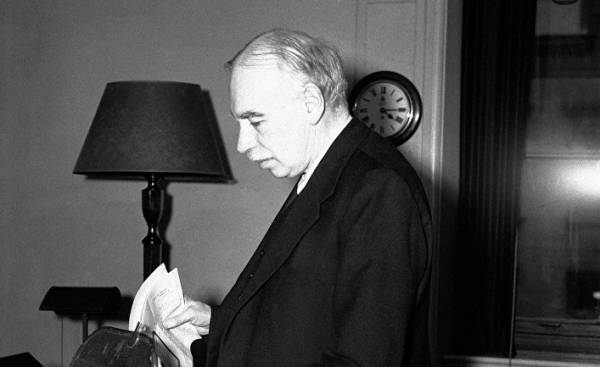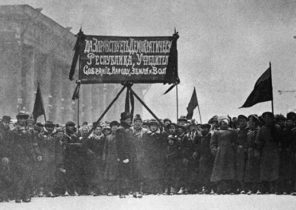
LONDON — IN early January, the chief economist of the Bank of England’s Andy Haldane laid the blame for the recent errors of the forecasting models of the Bank of England to “irrational behavior.” The inability of the regulator to provide this irrationality has led to the fact that he predicted the slowdown in the British economy after the referendum on Breccia in June last year. But in reality, after voting for secession from the European Union, British consumers began to uncontrollably spend, and equally illogical, began to rise in the construction industry and the service sector.
The Haldane offers no explanation of this explosion of irrational behavior. But he can’t do it. For it is irrational in General, any behavior that is not consistent with the predictions based on economic models of the Bank of England.
And it’s not just Haldane or the Bank of England. Leading economists put in the term “rational behavior” a completely different meaning than you or me. In ordinary language, rational behavior is a reasonable behavior in the circumstances. But in the sublime world of neo-classical models predict it means that the people with detailed knowledge about himself, about his surroundings and about the future that awaits them, acting optimally in pursuit of their goals. To act rationally means to act in accordance with economic models of rational behavior. When the behavior is different, economists react to it like a tailor who blames the customer for something he doesn’t only fit that a tailored suit.
However, the funny fact is that all of these projections are based on totally unrealistic assumptions and assumptions, in many situations doing a wonderful job. The reason is that most people are creatures of their habits. Their preferences and life circumstances, in fact, does not vary from day to day, and making purchases, they are really looking for the best prices. As a result, their behavior demonstrates a high degree of regularity, which makes it predictable. You don’t need any Economics to understand that if the price of toothpaste of your favorite brand has increased, then you will probably start to buy pasta cheaper.
The forecasting models of Central banks, in fact, used the same logic. For example, the Bank of England predicted (and absolutely true), the depreciation of the pound sterling after the vote, Pexit. This should lead to higher prices and a slowdown in consumer spending. Haldane, still believes that this is what happens: the error of the Bank of England was more concerned with the “timing” of the event, but not with his logic.
This is equivalent to the assertion that a vote for Pexit fundamentally nothing has changed. As if people will continue to behave as it is assumed in the model, and will change only prices. However, any forecast is based on the repeated behaviors that is incorrect, when something really new.
Non-standard changes cause non-standard behavior. But custom does not mean irrational. This means, in the language of economists, has changed the original settings. The confidence that tomorrow will be much the same as it is today, disappeared. And in terms of such radical uncertainty, our models quantitatively measured risk no longer work.
The Bank of England admitted that PACSICOM will be followed by a period of uncertainty, and it will be bad for business. But the new situation created by Brexton, in reality turned out completely different than expected, the regulator, who listened only to the city of London. The majority of voters voted for secession from the EU, felt not the deterioration of their situation (how they “rationally” should have been), but on the contrary, believe that it will improve.
No matter, these sentiments are justified or not, the important fact is that they exist. In 1940 immediately after the German conquest of France economist John Maynard Keynes argued in one of his letters: “as for me, now I’m fully confident that we will win this war”. So many Britons are now more confident about their future.
This means that we are dealing with the problem — which is, Haldane hinted, but which he could not recognize in a forecasting model of the Bank of England. Important events affecting the economy, are beyond the closed borders of economic models. That is why macroeconomic forecasts are flung on the rocks when the sea ceases to be absolutely quiet.
The challenge was to develop macroeconomic models which are able to operate in storm conditions. These models should take into account radical uncertainty, and hence a high degree of unpredictability of human behavior.
The economy Keynes described the logic of choice under conditions of uncertainty. He wanted to expand the idea of economic rationality to consider the behavior in a situation of radical uncertainty, when we face not just of the unknown, and unknown, which could not offer (is unknowable unknowns). All this, of course, has far more serious political implications than the world in which we could reasonably expect that the future will be almost the same as the past.
Attempts to solve this problem have been made, but they were few and they were scattered. In his 2011 book “Beyond mechanical markets” economists Roman Freedman from new York University and Michael Goldberg of the University of new Hampshire convincingly argue that in economic models it is necessary to try “to take into account psychological factors, abandoning assumptions that the market participants behave irrationally”. They proposed an alternative approach to economic modeling, calling it “the Economics of imperfect knowledge”, and urged his colleagues to refrain from making “exact predictions”: the authorities must rely on an “Advisory” range, based on historical indicators, to cope with “excessive” jumps in asset prices.
Russian mathematician Vladimir Mash came up with an ingenious scheme of “optimizing bounded risk” (risk-constrained optimization), which explicitly allows for the existence of “zones of uncertainty”. The economy must provide a “very rough estimate-assumptions” that require “modeling and calculations only in moderation”.
However, these attempts to take into account the radical uncertainty in economic models, despite their courage, have the disadvantage of unrealizable dream to curb uncertainty by using mathematics or (as in the case of Mary) computing. Haldane, too, apparently, is more inclined to believe in the data arrays.
Meanwhile, Keynes was thinking in a completely different way. He wanted economic science made its judgement, based not only on mathematics and statistics, but also ethics, philosophy, politics and history. These items are excluded from the modern system of training of economists who have only one mathematics-computer skeleton. However, for a meaningful description of the world, as is often said of Keynes, economists need a good education.







